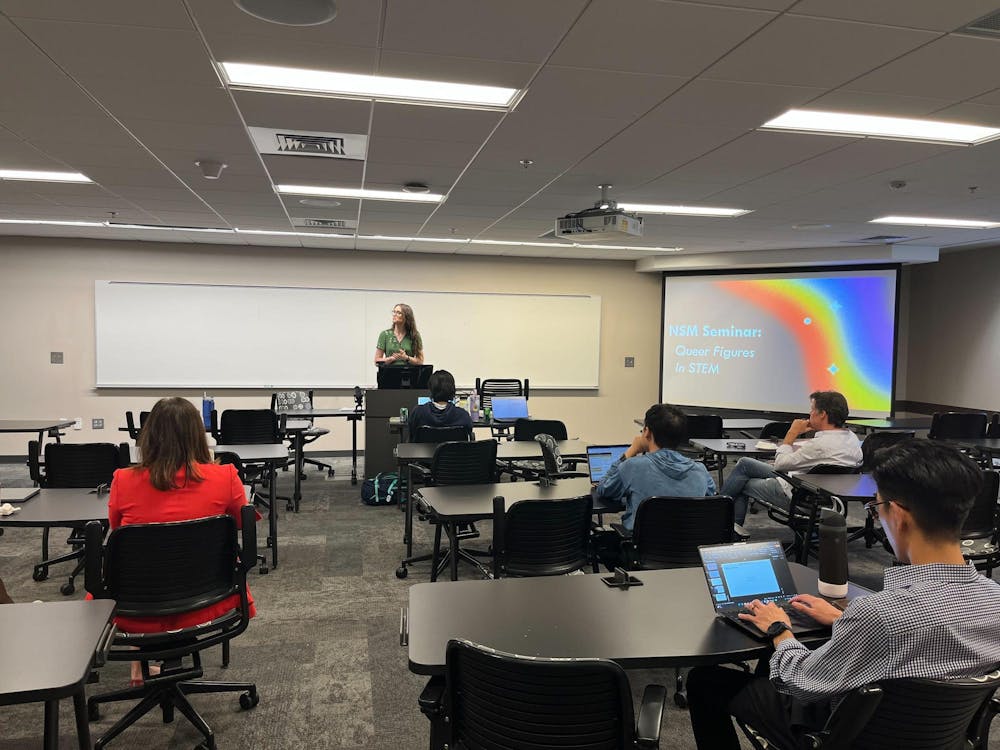Content Warning: This article contains references to suicide.
Oxford College’s Division of Natural Science and Mathematics hosted a seminar on Oct. 7 to recognize queer figures in the STEM field in celebration of LGBTQ+ History Month. This seminar was part of the division’s seminar series, which aims to provide opportunities for faculty to share topics of their interest and help the community better understand each other, according to Associate Professor of Biology Sarah Fankhauser.
Fankhauser wanted to hold the seminar close to National Coming Out Day on Oct. 11 and the Atlanta Gay Pride Festival on Oct. 12 and 13. She introduced Associate Professor of Mathematics Juliette Hulgan as the seminar facilitator.
Hulgan acknowledged that people identify themselves in many different ways.
“My hope is that in the future, we might also have other opportunities for sharing other ways that people can feel as if they belong, recognizing that I see myself in that person, focusing on things related to gender identity and sexual orientation,” Hulgan said.
About five faculty members spoke about queer individuals of their choice — some had personal connections to their selected figures, while others simply wanted to recognize their impact. They included not only experts in STEM but also activists for the environment and the LGBTQ+ community.
Assistant Professor of Mathematics Tien Chih introduced one of his closest friends, Demi Plessas, who is an artificial intelligence scientist. Chih, who said Plessas creates “impressive” design models, also announced that Plessas will visit Oxford as a speaker this upcoming March.
Instead of presenting more traditional scientists, Assistant Professor of Environmental Science Melissa Hage highlighted LGBTQ+ individuals who promote “sustainability and visibility.” Hage introduced Pattie Gonia, a drag queen, environmentalist and community organizer who utilizes photographs of herself in nature to inspire people.
Hage also presented Rose Marcario, the former CEO of Patagonia and current chair member of Rivian, an electric vehicle company.
Marcario is a self-identified queer woman who has been promoting sustainable actions her entire life. Hage added that Marcario worked to initiate “environmentally forward” policies at Patagonia.
Hulgan concluded the presentation of queer figures in STEM with Alan Turing, a key figure in cracking Germany’s Enigma cipher machine during World War II. The British government convicted Turing of gross indecency due to admitting to a sexual relationship with another man. Shortly after, he committed suicide after being put on hormone treatments.
“Words cannot describe how fortunate I am that we are not at a place like that,” Hulgan said. “Things are not perfect by any means, but it’s a really dark mark, dark stain on history within math and CS that Alan Turing was treated the way that he was because of loving who he loved.”
If you or someone you know is having thoughts of suicide, you can call Student Intervention Services at (404) 430-1120 or reach Emory’s Counseling and Psychological Services at (404) 727-7450. You can reach the Georgia Suicide Prevention Lifeline 24/7 at (800) 273-TALK (8255) and the Suicide and Crisis Lifeline 24/7 at 988.










